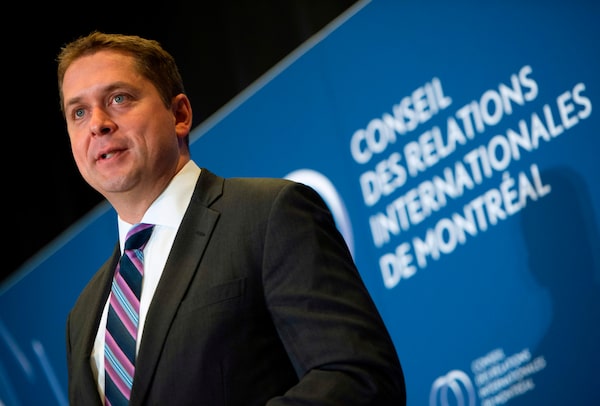
Andrew Scheer, it seems, expects that for Canada, the biggest solution to the turbulent world is that the United States will return to what it was.SEBASTIEN ST-JEAN/AFP/Getty Images
Forget China, and look for new trade elsewhere. Forge a closer alliance with the United States, because Donald Trump is just a blip. Build the military, and a bigger alliance with like-minded democracies.
Andrew Scheer’s “vision” speech for Canadian foreign policy was mostly Conservative Classic, not some new flavour. But it did include one big notion for the new, brutal, two-superpower world: forgetting hopes of a warm relationship with China, recognizing our interests are incompatible with Beijing’s and looking elsewhere in the Indo-Pacific region for trade.
It’s not surprising that a Conservative leader heading into an election wants to talk tough about China, especially right now, when Beijing has arbitrarily detained Canadians in retaliation for the arrest of Huawei executive Meng Wanzhou. But Mr. Scheer wasn’t just advocating retaliation, but retrenchment: dealing with China warily, not currying favour in pursuit of trade.
“For decades now, many in Canada have looked to China as a way of diversifying our export markets,” Mr. Scheer said. “But in recent years, it has become clear that China’s adversarial approach to Canada and the Western, democratic world has changed those expectations.”
It’s worth pointing out that Mr. Scheer’s specific plans to fight Chinese pressure over Ms. Meng won’t exactly bring Beijing to its knees. He has proposed withdrawing a $250-million Canadian contribution to the Chinese-backed Asian Infrastructure Investment Bank, but the impact would be symbolic. Launching a World Trade Organization complaint is worth pursuing, but won’t bring quick relief. Mr. Scheer has complained Ottawa has done nothing to stop China from blocking exports of Canadian canola, but he doesn’t really have a solution, either.
But Mr. Scheer’s speech is still noteworthy for an approach beyond the current dispute: It is, in effect, a call for a wary engagement with China in the future, and that must mean doing less with Beijing, not more. The problem, of course, is that a lot of Canadian companies, and farmers, will fear that means losing business with China. Mr. Scheer suggested looking across the Indo-Pacific for new trade, but that’s no quick, magic solution, either.
Still for one superpower, at least, Mr. Scheer had a clear diagnosis. This speech to a Montreal luncheon crowd of mostly business people, after all, was supposed to outline for the first time Mr. Scheer’s vision for foreign policy.
In general, it was standard Conservative fare. It was pro-Israel and pro-military, more about alliances than multilateralism. Mr. Scheer quoted Winston Churchill, rather than Lester Pearson.
Mr. Scheer reiterated his promise to recognize Jerusalem as capital of Israel, following Mr. Trump, and later told reporters that would mean moving Canada’s embassy from Tel Aviv – a repeat of the promise former PM Joe Clark made in 1979, but later abandoned.
He took some shots at Prime Minister Justin Trudeau, even though last-minute changes to his draft toned down the personal attacks on Mr. Trudeau as a prima donna. He chastised Mr. Trudeau and his government for being neutral and unwilling to pay the price for standing up for democracy and human rights, but of course, his Liberals have feuded with Saudi Arabia and Russia over both.
To be fair, Mr. Scheer’s speech, one of five designed to outline the Conservative Leader’s vision for leading the country, can only provide a sense of what kind of leader he would be – not a whole foreign policy.
But it was he who pointed out “that the world has become a very different place,” so you would have expected his vision for dealing with the other superpower would have said more about dealing with Mr. Trump’s dog-eat-dog approach.
Mr. Scheer’s U.S. policy is the old Conservative policy: Pull closer to Washington, building stronger security and trade alliances.
When Mr. Scheer promised that a Conservative government would start negotiating Canada’s entry into the U.S. ballistic missile defence program, it brought to mind Mr. Trump’s likely response: How much will Canada pay?
The U.S. President, after all, has complained that South Korea is not paying $1-billion of the THADD missile-defence system that is supposed to protect the country from North Korean projectiles, and he regularly expresses the notion that NATO allies should be getting a bill for American protection. So Mr. Scheer might just find that Mr. Trump’s reaction to missile-defence talks is not gratitude, but an invoice.
The bigger issue is that Mr. Trump, and what he represents, might not vanish so quickly. His term ends in 2021, he might win re-election, and even if he doesn’t, a big chunk of his protectionism and America-first isolationist sentiment might be left behind in U.S politics. Mr. Scheer, it seems, expects that for Canada, the biggest solution to the turbulent world is that the United States will return to what it was.
 Campbell Clark
Campbell Clark